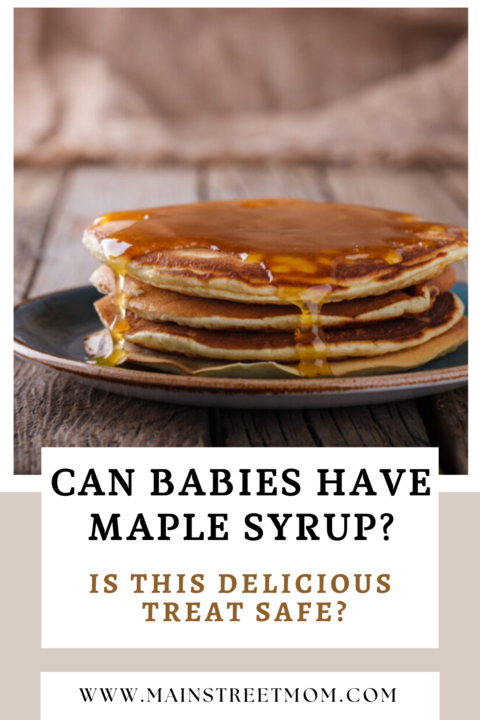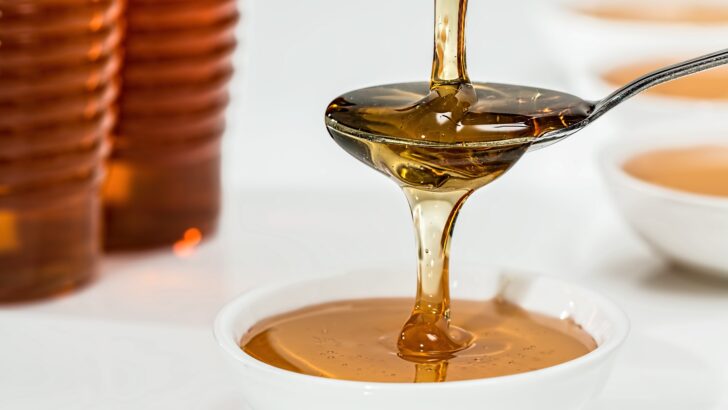Today, we have gathered here to answer one very important question: Can babies have maple syrup? Is this sweet Canadian delicacy safe for your little one?
Sometimes it can be extremely hard and challenging to catch up on what food items are safe for babies and what should be avoided at all costs. Especially if you’re new to the parenting game.
On one side, you have pediatricians and nutritionists telling you all the things you should and shouldn’t do. And on the other, you have your mother and your mother-in-law telling you how doctors have no clue and how things were simpler back in the day when they were raising babies.
Who to listen to? And how to know what’s best for your baby?
Fear not! This article is based on facts, science, and experience, and I’m sure it will help you find the answers you need. So, without further ado, let’s jump right into it!
Can babies have maple syrup?
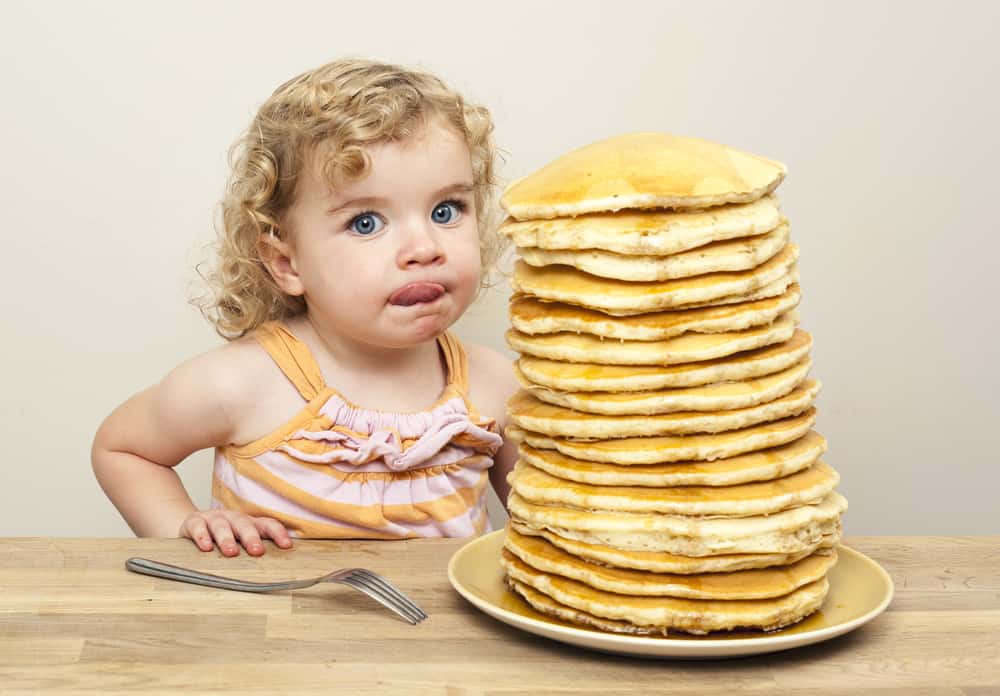
Although this might sound like a simple question, the answer to it is far from being a “Yes” or “No” matter.
Generally speaking, babies younger than 6 months should not have maple syrup. This is because, at 6 months, parents or caregivers usually start introducing solid foods into their diet. Before that, babies rely only on breast milk and/or formula.
This is where things get tricky. Even though after 6 months maple syrup is technically safe for your baby to have, that still doesn’t mean that your baby should eat it.
There’s an important difference between something that’s safe and something that’s safe and healthy. Unfortunately, maple syrup may not fit into the second category.
One tablespoon of maple syrup contains a lot of vitamins and minerals. It is a great source of calcium, potassium, magnesium, zinc, and riboflavin.
However, maple syrup is also considered to be a high-calorie food. That same tablespoon of maple syrup has around 52 calories and whopping 12 grams of sugar.
Also, there’s always a chance that you don’t have pure maple syrup at your home, but rather a maple-flavored syrup which is much more processed and contains more sugar, preservatives, and food coloring. Bear in mind that it’s recommended that children under the age of 2 should consume no added sugar at all.
So, even though maple syrup does have some beneficial vitamins and minerals, at the end of the day, it’s still a sweetener whose intake should be regulated.
When is the safest time to introduce your baby to maple syrup?
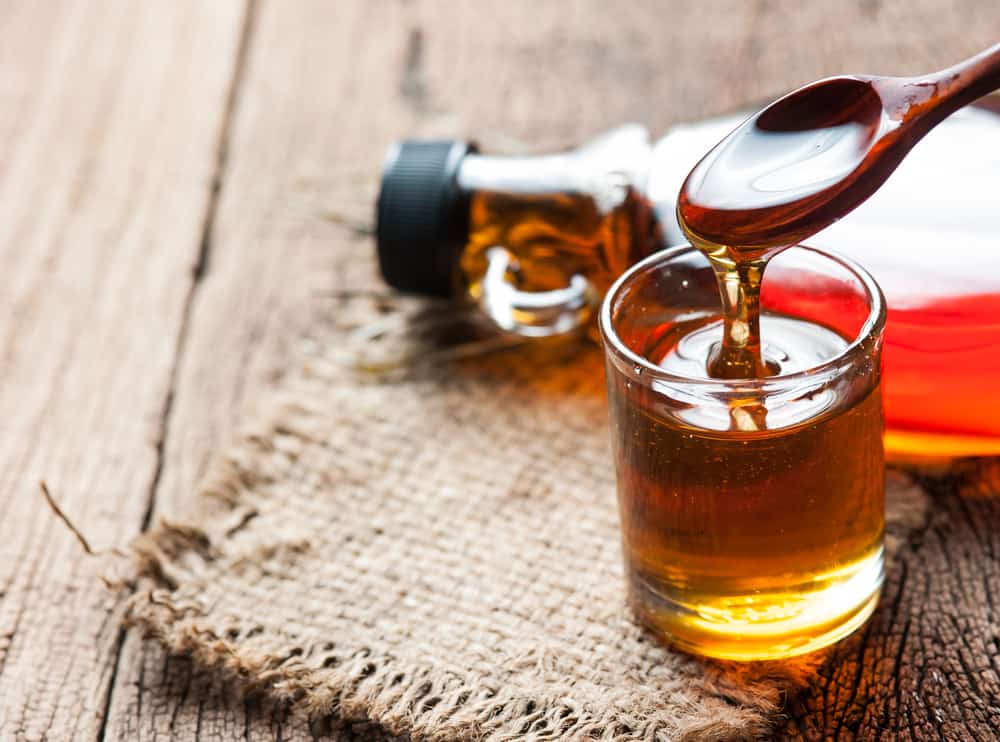
At your own risk, you can introduce maple syrup into your six-month-old baby’s diet. However, it is recommended to wait at least until the baby celebrates her first birthday.
Some experts even recommend waiting until the baby’s second birthday to give them maple syrup and other sweets since it can be more beneficial to their health.
Personally, I think it would be best to wait until your baby turns one to introduce sweets into the diet. Even then, the amounts should be carefully regulated, so that the baby does not get used to it and become almost “addicted” to sweets.
Generally speaking, babies have an affinity for sweet foods, and once they try them, there’s usually no coming back. So, the longer you wait, the longer you can be sure that your baby will want to eat a variety of foods.
I can confirm this with my own experience. One of my nieces was introduced to sugar very early. And it’s safe to say she fell in love with it.
Even today, at the age of 8, she is a big problem for her mother when it comes to deciding what to eat for lunch. That little girl will have a hard time eating anything that isn’t chocolate or candy.
Now we’re all trying to combat her sugar addiction which is not an easy task at all.
Therefore, there’s no precise answer to the abovementioned question. It all depends on your personal preference and parenting style. Whether you’re going to give your baby some maple syrup when she turns 6, 12, or 24 months, is entirely up to you.
The important thing is you don’t introduce it to your baby’s diet before she turns 6 months old.
Are there any potential risks in giving your baby maple syrup?
1. Your baby might have an allergic reaction
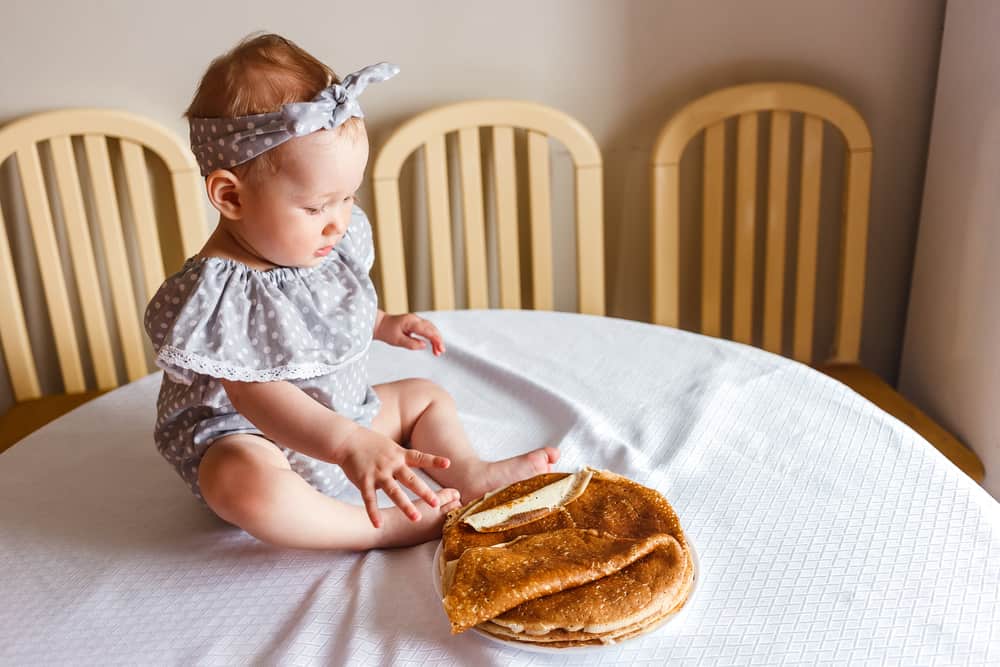
Even though allergic reactions to maple syrup are not that common, they can still occur. Maple syrup is made out of tree sap, which contains pollen, a common allergen in humans. So, if you have pure maple syrup at home and your baby shows a reaction to it, it might be because of the pollen it contains.
Some common symptoms of maple syrup allergy include nasal congestion, itching of the skin, tummy pain, trouble breathing, coughing, and sneezing.
2. Your baby’s teeth might start to decay
Contrary to what you might believe, non-refined sugars like maple syrup or honey can be just as damaging as refined white sugar. Both of them are known to encourage the growth of mouth bacteria that is linked to tooth decay.
Those bacteria turn the sugar into acid which first softens, then eats away the enamel (the shiny outer coat of a tooth) on our teeth. Those bacteria also change the natural pH of saliva which makes teeth more prone to cavities and gum disease.
Primary or baby teeth are not as strong and their enamel is not as thick as it is with permanent (or grown-up) teeth. Therefore, they are more susceptible to tooth decay whose main culprit is, as already mentioned, sugar.
3. Your baby will be less likely to eat more healthy food
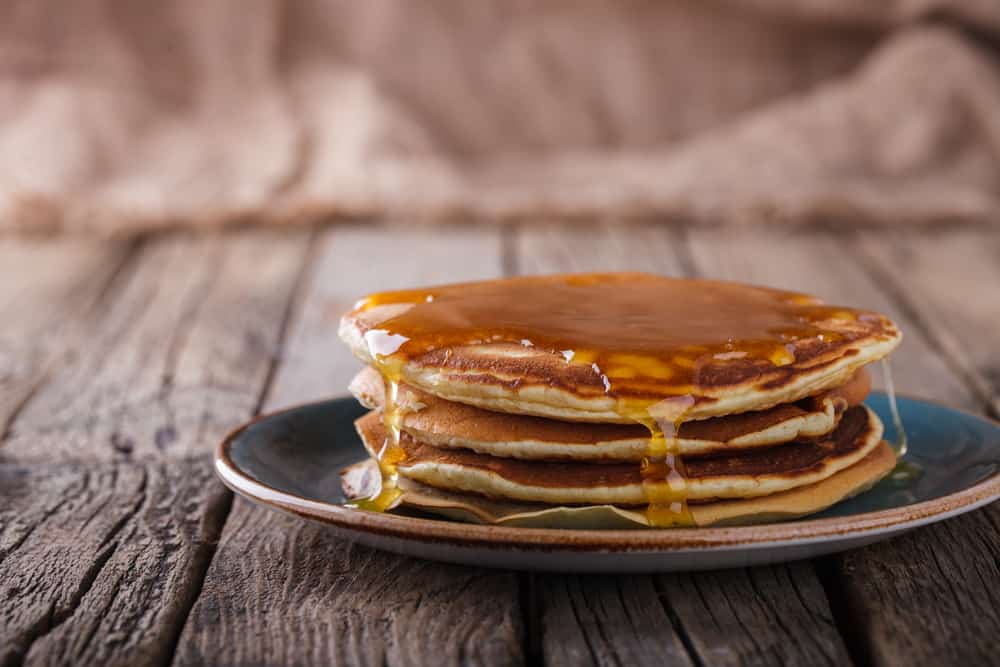
As was briefly stated before, babies love sugar. Once they try it, they start to crave it more and more. So much so, that some babies refuse to eat anything that doesn’t contain sugar.
Sugar, as we all know, doesn’t have any special nutritional value. Yes, it is one of the energy sources, but it’s often referred to as “empty calories” which is something a healthy baby doesn’t need in her development.
It’s important to give your baby a variety of healthy and nutrition-packed foods full of protein and healthy fats as soon as they’re introduced to solid foods. This way, you’ll know for sure that they’ll get used to healthy stuff and won’t become picky eaters later.
4. In the long run, your baby might become severely obese
Giving your baby some maple syrup every once in a while will probably do her no harm.
However, if the amount exceeds recommended portion intake, the high sugar levels from maple syrup can lead to extra calorie consumption or an energy surplus, which will inevitably result in unwanted weight gain in the long run.
Excess weight can consequently result in other problems like type 2 diabetes or hypertension (high blood pressure). I’m sure you don’t wish your child to struggle with these if there’s a chance to avoid them.
5. If you give your baby raw maple syrup, it can lead to infant botulism
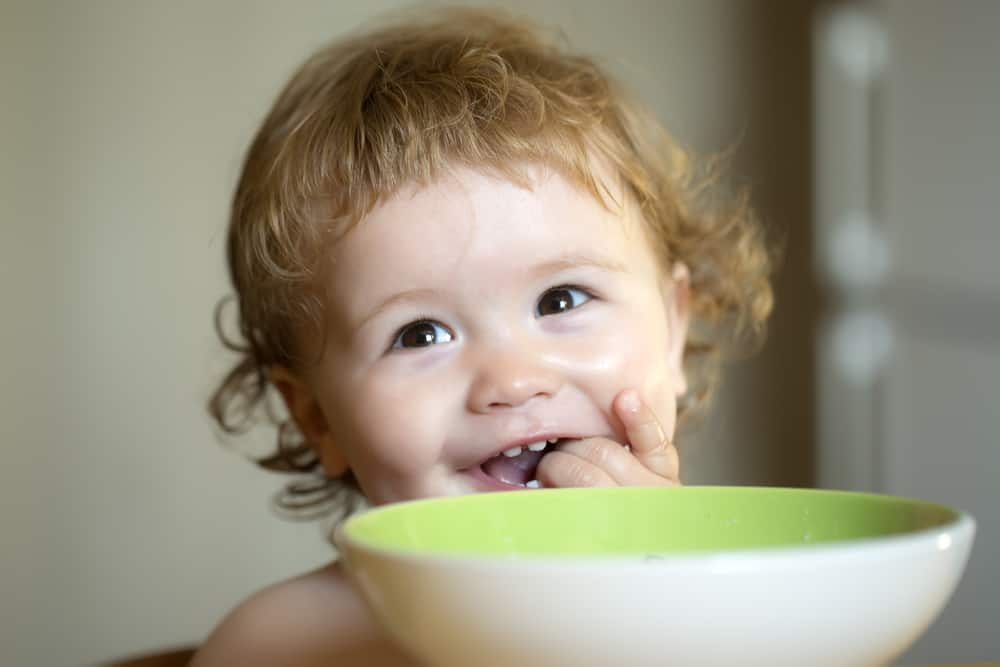
Infant botulism is a serious condition that appears as a result of a toxin intake from a type of bacteria called Clostridium Botulinum that starts to grow in the baby’s intestines. These bacteria attack the baby’s nervous system, spine, and muscles.
This condition is usually caused by bacteria from honey, another sweetener that should be avoided before the baby’s first birthday, and it only rarely happens because of maple syrup intake.
But when it does, it means that the baby consumed raw maple syrup sap, which should never be given to a baby.
The reason why children and adults are allowed to eat maple syrup and honey is, of course, because their immune system is far better at fighting the spores found in these sweeteners than the babies’ is.
The immune system in infants is still in the developing stage and their gut microbes are not ready to protect them from potential infections.
Some symptoms of infant botulism include constipation, muscle weakness, drooling, fatigue, droopy eyelids, trouble with eating, paralysis, etc.
6. Maple syrup can make other foods cause a choking hazard
Although maple syrup itself cannot lead to choking, because it’s so sticky, it can lead to other food items causing a choking hazard.
So, you should never leave your baby alone with food. Always keep an eye on her and follow baby-appropriate serving suggestions. In case you do want to implement maple syrup into your baby’s diet, make sure you add it to soft foods like mashed bananas, apple purée, or similar.
Final thoughts
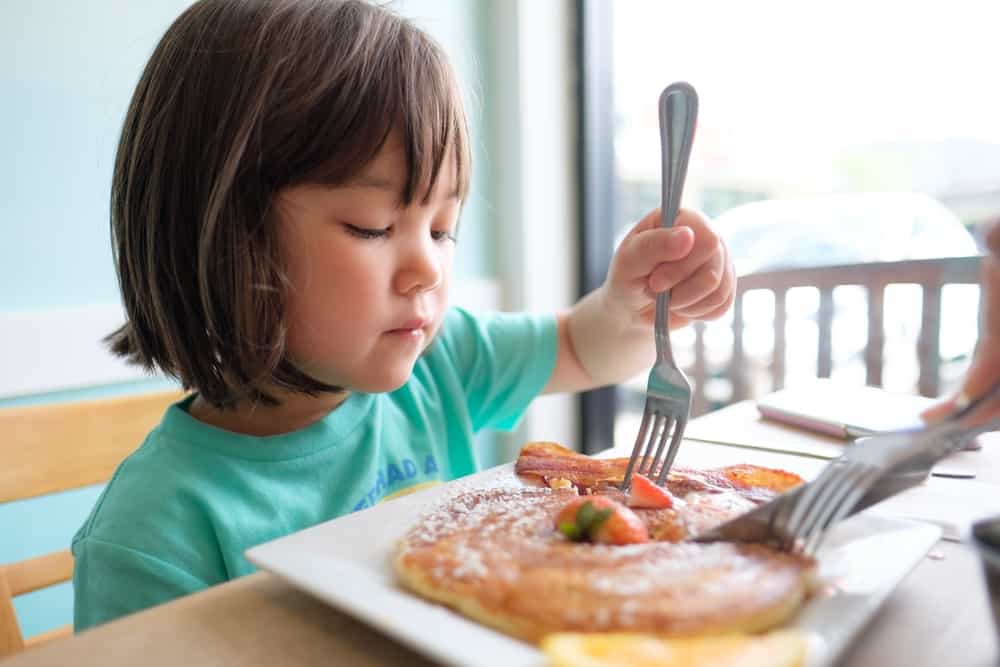
Let’s summarize! Can babies have maple syrup? Yes, if they’re at least 6 months old.
The recommended age to start implementing sweeteners into your baby’s diet is actually around her first birthday, but you can give it to her earlier if that’s what you want.
However, be careful when giving it to your baby. Make sure you start with smaller amounts and don’t make this an everyday kind of practice. Stick to half a tablespoon of maple syrup every few days, or just on the weekends. Let this be a sweet occasional treat rather than a regular dessert option.
Also, if you’re going to be giving maple syrup to your little one, make sure you buy high-quality and organic maple syrup. Always close the container well after use and store it somewhere far from foods with potent odors since maple syrup can absorb the smell.
And my last piece of advice, if you wish to introduce sugar to your baby’s diet, maybe consider starting with some healthier options. Give your baby fresh or dried fruits cut into small, edible pieces or make delicious purées out of them. Smoothies are a great option, too.
Dates can be an amazing candy alternative as they are very sweet and packed with amazing nutrients. Soak pitted dates in warm water for several minutes, de-pit them, and put them in the food processor to make a fine paste and serve it to your baby. Trust me, she’ll love it.
Read this: Cravings 101: Can You Eat Truffles When Pregnant?
